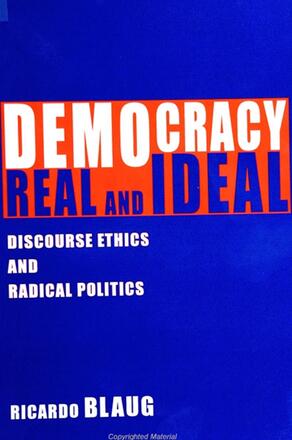
Democracy, Real and Ideal
Discourse Ethics and Radical Politics
Alternative formats available from:
Explores the political implications of Habermas's theory of discourse ethics through a resurrection of its radical potential when applied to participants in decision-making groups.
Description
By focusing the various difficulties encountered in applying theory to practical concerns, this book explores the reasons for the absence of a radical politics in Habermas's work. In doing so, it shows that certain political implications of the theory remain unexplored. The book articulates a unique application of Habermasian theory, the actual functioning of decision-making groups, the nature of deliberative interaction, and the kinds of judgments participants must make if they are to preserve their democratic process.
Ricardo Blaug is Lecturer in the Department of Politics at the University of Leeds.
Reviews
"The author breaks new ground with this original and penetrating discussion of practical issues raised by theories of discourse ethics and discursive democracy. Blaug displays an impressive mastery of the secondary literature in English, and is admirably persistent in pursuing the issues raised." — William Outhwaite, University of Sussex, Brighton, United Kingdom
"Ricardo Blaug has written an important study that forges a link between the abstract and normative conceptions of 'democracy' and a more concrete sense of political participation or what might be called 'strong citizenship.' Given that the latter is rather weak on the ground everywhere, and perhaps most of all where routine claims are made for it, I see Blaug's as a significant challenge.
"One of the most important themes in the book, in my view, concerns the idea of the 'democratic break-out.' Blaug frames the issue in a way that is both provocative and systematic: How to keep the democratic and participatory spirit alive once the newly-energized citizens have come down from the barricades and are faced with the day-to-day tasks of running a society. While Blaug's work is clearly coming out of the Habermasian universe, what distinguishes his work from much in this field is the fact that this energy and those barricades are indeed present." — Bill Martin, author of Politics in the impasse: Explorations in postsecular social theory